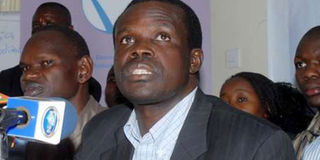Group wants sections of Cybercrimes Act reviewed

The Civil Society Reference Group convener Suba Churchill has said the Computer and Cybercrimes Act takes away the rights and freedoms of Kenyans guaranteed under the Constitution. PHOTO | FILE | NATION MEDIA GROUP
What you need to know:
- The group has also threatened to team up with other non-State actors to challenge the constitutionality of the law in court.
- It says it punitive and unfair to place the burden of verifying the authenticity of any information on ordinary citizens and media agencies exercising and enjoying their right to freedom of expression
- It adds if the law is left unchallenged, it will not only undermine the fight against corruption but also allow the State and its agencies to get away with lack of transparency.
The Civil Society Reference Group (CSRG) has threatened to petition the National Assembly to review and amend sections of the Computer and Cybercrimes Act signed into law by the President.
Convener Suba Churchill said the sections of the Act that became law on May 16 were designed to protect State and public officers who fail the integrity test, as required of them under Chapter Six of the Constitution.
The group said the Act takes away the rights and freedoms of Kenyans guaranteed under the Constitution.
INTEGRITY
“It is not lost on the CSRG that a number of sections of the Act are designed to protect and preserve the declining reputation of State and public officers who are appointed or elected on the basis of meeting the requirements of Chapter Six of the Constitution on Leadership and Integrity, but engage in actions that contravene the provisions as soon as they are elected or confirmed in office,” said Mr Suba Churchill.
The group has also threatened to team up with other non-State actors to challenge the constitutionality of the law in court.
SELF-CENSORSHIP
They argued the sections they want reviewed constitute a deliberate attempt to intimidate the public, the media, investigative journalists, bloggers and whistle blowers into self-censorship so that they do not publicise information that could be crucial in the fight against corruption in public offices.
“It would therefore be punitive and unfair to place the burden of verifying the authenticity of any information on ordinary citizens and media agencies exercising and enjoying their right to freedom of expression which, as articulated in Article 33 of the Constitution, includes freedom to seek, receive and impart information or ideas,” said Mr Churchill.
PENALTIES
Mr Churcill said, if the law is left unchallenged, it will not only undermine the fight against corruption but also allow the State and its agencies to get away with lack of transparency, accountability and the duty to publish and publicize any important information affecting the nation .
“With the presidency having failed to heed public outcry that followed the publication of the bill, and the National Assembly failing massively in its representative and oversight role, preferring to sing and dance to the tune of the Executive, the judiciary must now weigh in and come to the rescue of the people, the media and tone down the excessive penalties that the law prescribes,” he said.





